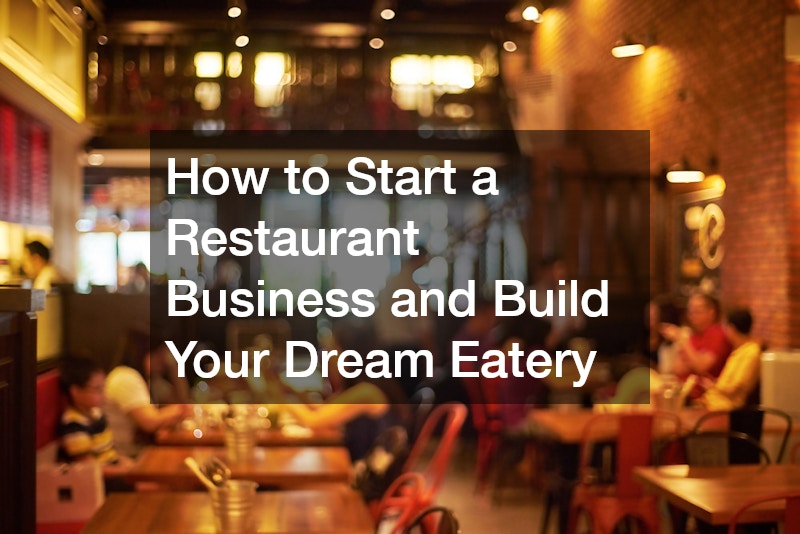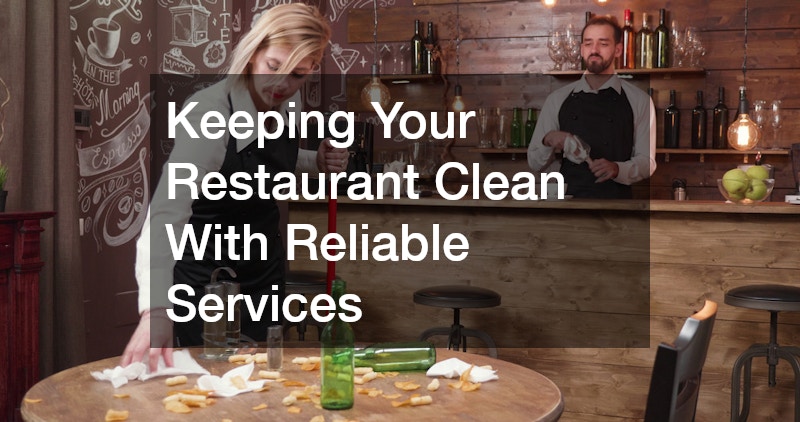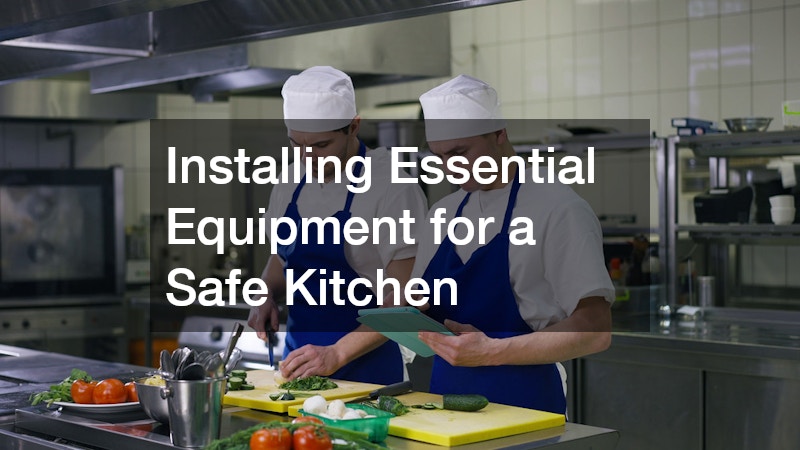Starting a restaurant is an exciting journey filled with opportunities, challenges, and careful planning. For aspiring restaurateurs, turning a culinary vision into a thriving business requires much more than just a passion for food. From conceptualizing a unique menu to securing the right location, every decision shapes the success of the venture. Many people underestimate the complexity involved in managing operations, ensuring safety, and creating an inviting environment for customers. It’s a path that demands both creativity and practical business acumen. Beyond the day-to-day operational considerations, restaurant owners must anticipate challenges that might arise months or even years after opening. This includes managing staffing turnover, staying ahead of market trends, and continually innovating to attract repeat customers. Those looking to start a restaurant business must prepare for these long-term operational demands from the outset.
Before opening doors, entrepreneurs must navigate a series of logistical, financial, and regulatory hurdles. Understanding health codes, labor laws, and local ordinances is crucial, as is crafting a business plan that addresses startup costs, cash flow, and marketing strategies. Beyond these foundational aspects, operators must think about the customer experience from the moment patrons arrive. Ambiance, cleanliness, and operational efficiency all contribute to a memorable dining experience that encourages repeat visits. Many new restaurateurs overlook the importance of integrating technology for both front-of-house and back-of-house operations.
Succeeding in the restaurant industry also requires forethought in operational systems. This includes everything from sourcing ingredients to maintaining equipment, managing waste, and ensuring staff safety. Each decision impacts both profitability and reputation, highlighting the importance of careful planning and execution. As trends in sustainability and technology continue to influence the market, understanding how to implement efficient and eco-friendly solutions can differentiate a restaurant from its competitors. For instance, energy-efficient kitchen appliances, LED lighting, and sustainable packaging not only reduce costs but also appeal to environmentally conscious consumers.
Ensuring Safe and Clean Water for Your Restaurant

Access to safe and clean water is non-negotiable for any restaurant. Not only is it essential for cooking and cleaning, but it also impacts the health of both customers and staff. A high-quality water filtration system ensures contaminants are removed, delivering clean water that meets health standards. Regular testing and maintenance of these systems help prevent issues such as bacterial growth or sediment buildup, which can compromise water quality. Investing in reliable filtration equipment is a proactive measure that supports operational efficiency and builds customer trust in your establishment. Restaurants that fail to prioritize water safety risk health code violations and potential reputational damage, which can be costly to recover from. Ensuring access to safe water is a critical step for anyone looking to start a restaurant business.
Beyond compliance, water quality influences the taste of beverages, soups, sauces, and other dishes. Using filtered water ensures consistency in flavor, which is crucial for maintaining a loyal customer base. Some restaurants even advertise their commitment to clean water as a differentiating factor, highlighting it as part of their dedication to quality and hygiene. Staff training on the proper maintenance and monitoring of water systems is essential, ensuring potential problems are identified early and addressed promptly.
Choosing the Right Filtration Solutions for Your Kitchen
Different restaurants have varying water needs depending on menu complexity and daily volume. Selecting the right water purifiers for your kitchen involves assessing both capacity and filtration capabilities. Some purifiers are designed for high-output commercial kitchens, while others are better suited for smaller operations. Understanding your specific requirements ensures you provide consistently clean water for food preparation, beverage service, and dishwashing. Quality filtration not only safeguards health but also enhances the taste and presentation of your dishes, contributing to a superior dining experience. Choosing the appropriate filtration system is an essential consideration when you start a restaurant business.
It’s also important to consider the maintenance schedule and cost of replacement filters. Investing in high-quality units may have a higher upfront cost but can save money in the long run by reducing breakdowns and ensuring consistent performance. Consultation with a professional can help determine which filtration system aligns best with the restaurant’s volume and menu requirements, providing both efficiency and peace of mind.
Managing Waste Efficiently and Sustainably
Proper waste management is a crucial component of running a successful restaurant. Grease recycling programs allow kitchens to dispose of used cooking oils responsibly, reducing environmental impact while complying with local regulations. Recycling initiatives and efficient waste separation systems minimize landfill contributions and can even create additional revenue streams through repurposing. Implementing structured waste management practices helps restaurants maintain cleanliness, reduce operational risks, and demonstrate a commitment to sustainability that resonates with customers and staff alike. Efficient waste management is an essential part of planning when you start a restaurant business.
Beyond grease recycling, waste management should include composting organic matter, separating recyclables, and training staff to handle waste properly. Efficient disposal not only reduces environmental impact but can also improve kitchen workflow, minimizing clutter and hazards. As consumers increasingly value environmentally responsible businesses, visible sustainability efforts can enhance a restaurant’s brand and appeal.
Protecting Your Restaurant With Proper Fire Safety

Restaurants face significant fire risks due to cooking operations, electrical equipment, and high-traffic kitchens. Partnering with professional fire maintenance services ensures that all safety equipment is installed correctly and remains functional. Regular inspections, employee training, and maintenance routines help mitigate hazards, protect staff, and prevent costly damage. Effective fire safety planning also instills confidence among customers, showing that the establishment prioritizes safety alongside quality service. Proper fire protection is a fundamental concern for anyone planning to start a restaurant business.
Expanding on this, integrating automatic suppression systems, smoke detectors, and fire-resistant materials can further reduce risks. A detailed emergency response plan ensures that all team members know how to act in the event of an incident. Periodic drills and continuous education reinforce awareness and preparedness, minimizing potential downtime and liability.
Creating Durable and Attractive Outdoor Spaces
The exterior of a restaurant sets the first impression for guests. Well-designed patios, walkways, and parking areas, installed and maintained by skilled paving contractors, enhance curb appeal and functionality. Durable surfaces withstand heavy foot traffic, weather conditions, and routine maintenance needs. Thoughtful design contributes to the overall dining experience, encourages customer loyalty, and ensures that outdoor areas remain safe and inviting year-round. Investing in high-quality paving work is a long-term solution that supports both aesthetic and practical objectives. When you start a restaurant business, considering the exterior as carefully as the interior can have a lasting impact on customer impressions.
Adding seating, landscaping, and lighting in outdoor areas can transform these spaces into additional revenue-generating sections, especially for casual dining and seasonal offerings. Accessibility considerations and clear pathways are vital to ensure all guests enjoy a welcoming experience.
Handling Waste Disposal With Ease
Regular and reliable dumpster rental services are critical for managing daily refuse efficiently. Proper scheduling and sufficient container capacity prevent overflow and ensure compliance with local waste regulations. Streamlined waste removal systems minimize odors, reduce health hazards, and support a clean and organized kitchen environment. Partnering with dependable providers simplifies operations, allowing staff to focus on service and food quality rather than logistical challenges. Effective planning for waste disposal is key when you start a restaurant business.
Proactively planning for peak periods, special events, and menu changes ensures that waste management remains seamless even during high-volume days. Customizing dumpster solutions for different waste streams—organic, recyclable, and general trash—further enhances efficiency.
Keeping Your Restaurant Clean With Reliable Services
Garbage collection plays a central role in maintaining sanitary conditions in and around the restaurant. Timely removal of waste prevents contamination, pest infestations, and unpleasant odors. Professional collection services provide consistent support, enabling restaurants to meet health inspections and maintain customer confidence. Cleanliness, reinforced through organized garbage disposal, is a cornerstone of operational excellence and a vital part of building a respected dining establishment. Anyone looking to start a restaurant business must prioritize cleanliness from the beginning.
Staff education and monitoring protocols complement professional collection services. Establishing standard operating procedures for cleaning schedules, spill response, and equipment sanitation ensures that standards remain consistently high and compliance with health codes is maintained.
Maintaining Fresh Ingredients With Proper Storage
A cold storage facility is essential for preserving the freshness and quality of perishable items. Temperature-controlled environments prevent spoilage, reduce food waste, and maintain ingredient integrity for optimal flavor. Selecting appropriate refrigeration and freezer systems based on kitchen volume and menu needs ensures that ingredients are stored safely and efficiently. Proper maintenance routines, including regular cleaning and temperature checks, are critical for consistent performance and compliance with health regulations. Establishing proper storage protocols is vital when you start a restaurant business.
Inventory management systems integrated with storage units can track expiration dates, optimize usage, and reduce losses. Rotating stock using the first-in, first-out method ensures that ingredients remain fresh and reduces unnecessary spending. Well-maintained cold storage directly contributes to both operational efficiency and guest satisfaction.
Designing a Memorable and Effective Restaurant Identity
Signage plays a vital role in branding and attracting customers. Working with a custom sign company allows restaurants to create visually compelling and cohesive designs that reflect their brand identity. High-quality signs enhance visibility, communicate professionalism, and draw in potential diners. Effective signage not only serves a marketing function but also complements the overall dining experience, helping to establish a memorable and recognizable presence in the community. Thoughtful branding supports entrepreneurs who start a restaurant business and wish to leave a lasting impression.
Brand consistency extends beyond signage to include menus, staff uniforms, interior décor, and digital presence. A cohesive identity fosters trust and makes it easier for customers to remember and recommend the restaurant.
Installing Essential Equipment for a Safe Kitchen
Restaurant kitchen hood installation is a critical aspect of operational safety. These systems remove smoke, heat, grease, and odors, maintaining air quality and reducing fire risks. Proper installation and routine maintenance ensure compliance with safety standards and enhance kitchen efficiency. By investing in reliable hood systems, restaurateurs protect both staff and property while providing a comfortable cooking environment that supports high-quality food production. Kitchen equipment installation is a central consideration when starting a restaurant business.
Beyond installation, regular inspections, cleaning schedules, and monitoring of airflow ensure long-term performance. A well-maintained hood system contributes to staff comfort, compliance with local regulations, and an overall safer kitchen environment.
Launching a restaurant requires careful planning, dedication, and attention to operational details. For anyone looking to start a restaurant business, understanding the foundational elements that contribute to a successful operation is essential. From clean water and proper filtration to effective waste management and fire safety, each decision directly impacts both the safety and satisfaction of staff and customers. A restaurant that invests in these critical areas demonstrates professionalism and fosters trust, which is crucial in a highly competitive market.
Equally important is the focus on storage, signage, and kitchen equipment. Cold storage facilities preserve ingredient quality, while custom signs help establish a strong brand presence. Installing a proper kitchen hood system ensures compliance with safety regulations and supports staff efficiency. Each of these elements, when implemented thoughtfully, contributes to a cohesive and well-managed operation that can withstand the challenges of daily service.
For those aiming to launch their own restaurant, the journey extends beyond opening day. Ongoing maintenance, staff training, and consistent attention to operational systems create a sustainable model that can grow with the business. Strategic planning, including considerations for waste disposal, outdoor spaces, and cleanliness, ensures that restaurants remain inviting, safe, and efficient. Incorporating new technologies, eco-friendly practices, and customer engagement initiatives can further enhance reputation and profitability.
Ultimately, those prepared to open a restaurant venture with a comprehensive, thoughtful approach are more likely to build lasting success. By addressing critical operational components and embracing a culture of quality and safety, restaurateurs can create establishments that not only survive but thrive. Whether opening a single location or planning multiple venues, understanding and implementing these strategies provides a foundation for long-term achievement, turning the dream of a vibrant eatery into a reality. Launching a restaurant may be challenging, but with careful planning, attention to detail, and ongoing adaptability, it can be an incredibly rewarding endeavor that leaves a lasting mark on the culinary landscape. By continuously refining operations and focusing on both staff and customer experience, entrepreneurs set the stage to build a successful dining business that grows sustainably and enjoys enduring success in a competitive market.



